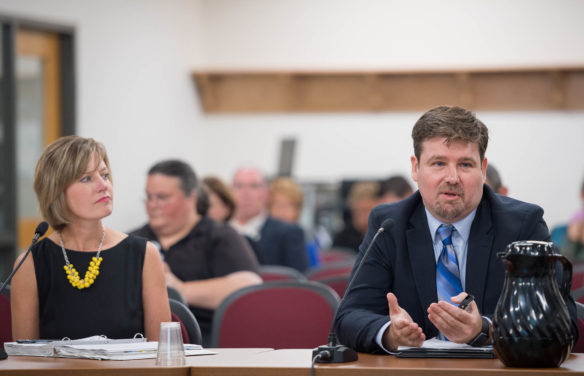
Amanda Ellis, left, and Anthony Mires update the Kentucky Board of Education about AdvanceKentucky, an initiative to increase access to and success in Advanced Placement courses, especially for low income and minority students. The group’s newest cohort of schools enroll 5,900 students – 70 percent of whom are low income and 20 percent of whom are a minority.
Photo by Bobby Ellis, Aug. 3, 2017
(FRANKFORT, Ky.) – At its meeting in Frankfort Aug. 3, the Kentucky Board of Education started talking about what to include in its 2018-20 biennial budget request.
According to Kentucky Department of Education staff, additional money will be needed to implement Senate Bill 1 (2017) for a study to ensure assessments are aligned with standards, test item development, an additional college admissions exam, industry certification expenses, revised data collection and reporting, and school improvement, among others.
Other items discussed include $157 million to expand the number of 4-year-olds in poverty who can be served in state preschool, $343.8 million for statewide all day kindergarten and $266 million to support 100 percent of school district transportation costs.
The items included in the list are based on input from education partners and districts. In total, the additional funding requests exceed $800 million.
The board will revisit the budget numbers and set funding priorities at its October meeting before submission to the governor’s office in November. The governor will submit the executive branch budget request to the General Assembly in January.
On the recommendation of the nominating committee, the board unanimously elected Mary Gwen Wheeler as chair and Rich Gimmel as vice-chair of the board for the upcoming year.

Mary Gwen Wheeler
“This is a really critical juncture in public education,” Wheeler said. “We are about to approve an accountability system that really tries to incentivize deeper learning, the ability to close our achievement gaps, and acknowledges and values the whole child. We are looking at charter schools, and there are many other things on our plate that truly call us to be transformational leaders to support our mission to ensure that each and every child across this Commonwealth is empowered and equipped with the knowledge, skills and dispositions to pursue a successful future. It’s really an honor to serve with each of you in leading this board.”

Rich Gimmel
The board modified its policy going forward to elect board officers in June to coincide with board terms which will now begin that month in accordance with Executive Order 17-364.
Chairperson Wheeler named member Gary Houchens as chair of the board’s curriculum, instruction and assessment committee and Ben Cundiff as chair of the board’s management committee.
Also at its meeting, the board heard an update on AdvanceKentucky, an initiative to increase access to and success in Advanced Placement (AP) courses, especially for low income and minority students, who are often underrepresented in rigorous courses. During his presentation, AdvanceKentucky Executive Director Anthony Mires announced the newest cohort of schools, which enroll 5,900 students – 70 percent of whom are low income and 20 percent of whom are a minority. The high schools in cohort 10 are:
- Barbourville Ind.
- Breathitt Co.
- Burgin Ind.
- East Ridge (Pike Co.)
- Iroquois (Jefferson Co.)
- Knott Central (Knott Co.)
- Magoffin Co.
- Paducah Tilghman (Paducah Ind.)
- Sheldon Clark (Martin Co.)
- Taylor Co.
Since the 2008-09 school year, AdvanceKentucky has worked with 119 high schools in 89 districts.
Data indicates participating schools showed a 62-144 percent increase in the number of qualifying scores (3 or higher) on math, science and English AP exams in the first year of the program – far above the state or national average, which generally range in the single digits. A qualifying score can earn a high school student college credit.
According to Mires, students who take an Advanced Placement course are much more likely to enroll in college, have a higher grade point average and persist to a degree. He said those with a qualifying score do even better.
On another item, the board learned that Kentucky once again led the nation in participation in a biennial working conditions survey. More than 41,000 school-based certified educators responded to this year’s Teaching, Empowering, Leading and Learning (TELL) Kentucky Survey – a record breaking 91 percent response rate.
“It is so important that we hear what our teachers think,” Associate Commissioner Amanda Ellis said.
Ellis said results show improvement in each one of the survey areas every time it has been given. This year, educators rated instructional practices and support the highest. Participants noted the use of time as the most challenging area, though it saw the most growth since the 2015 survey. Managing student conduct was down slightly from 2015.
Kentucky schools and districts use the results from the survey to improve working conditions, which in turn positively impact student learning.
Also at the meeting, the board approved:
- 780 KAR 3:072, Attendance, compensatory time, and leave for certified and equivalent service;
- 780 KAR 3:080, Extent and duration of school term, use of school days and extended employment;
- 702 KAR 7:065, Designation of Agent to Manage Middle and High School Interscholastic Athletics and Revision to Kentucky High School Athletic Association Bylaws (KHSAA);
- policy adoptions and amendments for the Kentucky School for the Blind (KSB) and Kentucky School for the Deaf (KSD);
- new district facility plans for Fort Thomas Independent and McCreary County. The Nicholas County request was delayed until the board’s October meeting.
- district facility plan amendment for Madison County
Also, the board reviewed:
- 704 KAR 3:370, Kentucky Framework for Personnel Evaluation
- the Kentucky High School Athletic Association (KHSAA) Annual Report
- a status update on state management in Breathitt and Menifee Counties
- the Kentucky Facilities Inventory and Classification System (KFICS)
Visit the board portal to access the board agenda and supporting materials online.
The next meeting of the Kentucky Board of Education will be a special called meeting later in August to consider the third reading of 703 KAR 5:270, Kentucky’s Accountability System and four new regulations to guide the implementation of the first charter schools in the state. A date and time for the special meeting will be announced.
The next regular meeting of the Kentucky Board of Education is scheduled for Oct. 3-4 in Frankfort.



Leave A Comment